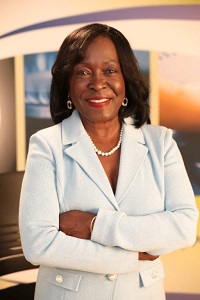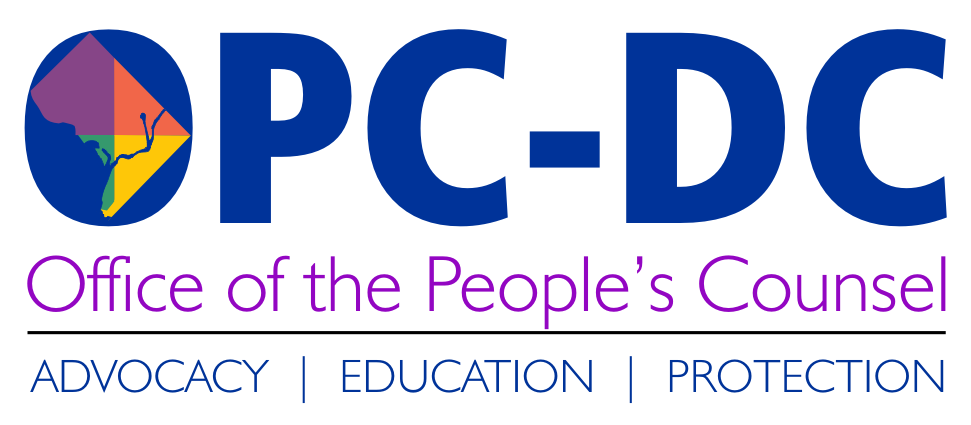The OPC CONNECTION – March, 2022
A Note from Your People’s Counsel
Sandra Mattavous-Frye
Let’s Make Solar Real for All

Given the growing importance of solar in the District’s energy landscape, and OPC’s commitment to mitigating the impacts of climate change, it’s critical for OPC to take steps to ensure all consumers across all wards have opportunities to benefit from renewable energy programs. This includes “community solar,” under which the benefits of a solar project flow to multiple households and businesses, even though solar panels are not on their property. Community solar can be a good option for residents who are unable to install the panels on their roofs. However, they can still lower electric bills through the power generated by a community solar system.
When utility consumers are missing out on any benefits they deserve…enter OPC. On March 23, 2022, OPC and the Office of the Attorney General jointly filed a complaint requesting that the Public Service Commission investigate problems with Pepco’s practices that have resulted in thousands of consumers missing out on their credits from the Community Renewable Energy Facilities (CREFs) and the Solar for All programs.
In the petition filed with the Commission, OPC states that the District Department of Energy and Environment, which oversees Solar for All, and OPC have received numerous complaints from CREF participants who are not receiving timely and accurate bill credits. After meeting with Pepco for nearly two years with no resolution, we believe the PSC must act now to protect consumers from further losses. Read here to see why it was important for OPC to file the petition, which you can find on this link.
Pepco, Washington Gas, and DC Water have informed OPC that they will begin disconnecting delinquent accounts starting in April. If you are behind on your bills, please contact the utilities to make payment arrangements. Call OPC at (202) 727-3071 if you cannot meet the terms the arrangement and we will try to negotiate a plan that works better for your budget.
On March 28th, People’s Counsel Sandra Mattavous-Frye presented OPC’s fiscal year 2023 budget request before the DC Council Committee on Business and Economic Development. Learn more about how OPC is Here2Help you! Read the testimony here, or watch the hearing by clicking on the image on the left. The People’s Counsel starts around 41:30.
In February, the District Department of Energy and Environment (DOEE) began administering a new federal program known as LIHWAP. It stands for Low Income Household Water Assistance Program. This federally funded program provides the following:
- A benefit of 25% of the applicant’s annual water bill (at a minimum of $250) or an emergency payment at a maximum of $5,000 to resolve an outstanding balance.
TIP: Consumers will receive just one of the benefits, not both. The application administrator determines the level of need and assigns the highest possible payment to the consumer’s account.
The assistance is income based. Consumers submit only one application to determine eligibility for LIHWAP and the Customer Assistance Program.
TIP: If you apply for LIHEAP (Low Income Home Energy Assistance Program), include your water bill information to see if you qualify for LIHWAP. By doing so, you will not have to submit two applications for LIHEAP and LIHWAP.
Apply now! There’s no word yet on how long the funding will be available, so don’t delay. The three ways to apply for LIHWAP are:
- Online: LIHWAP/CRIAC RESIDENTIAL RELIEF APPLICATION
- Email: Send application and required documents to wa*************@**.gov.
- Postal Mail: Send to DOEE, Attn: LIHWAP/CRIAC
Residential Relief Program
1200 First Street NE, 5 th Floor
, Washington DC 20002
For more information, visit DOEE’s Water Affordability page.
Contact OPC’s Water Services Division at(202) 727-3071.
Capturing Feedback from the Community
OPC frequently partners with organizations active in the community. Recently one such collaborator reached back to us to share the following:
Dear People’s Counsel Mattavous-Frye,
Thank you for your support and participation in the American Cancer Society’s Making Strides Against Breast Cancer Walk and Resource Fair [at the end of last year], sponsored by Zeta Phi Beta Sorority, Incorporated Omicron Phi Zeta Chapter, in partnership with The New Macedonia Baptist Church.
The Walk/Run was overwhelmingly successful…Thank you for your generous donation of the pink backpacks. The backpacks were graciously received by the breast cancer survivors. We are committed to continue Making Strides Against Breast Cancer and look forward to participating with the Office of People’s Counsel again, this year.
Sincerely,
Omicron Phi Zeta Chapter
Zeta Phi Beta Sorority, Inc.
Washington, DC
When DC consumers find themselves in a bind over a utility bill, OPC stands ready to answer the call to try to resolve the dispute. Here’s a case-in-point.
In January, OPC Consumer Services Specialist Cheryl Morse (right) received a call from Dr. Anna Kerttula de Echave, Treasurer of the 2800 Wisconsin Ave Condo Association in Northwest. Dr. Kerttula de Echave stated the association’s management company received a notice from Pepco, claiming the association owed the utility $43,984, of which $39,226 “must be paid to avoid shutoff,” for all 107 units. Dr. Kerttula de Echave explained what happened next in testimony she provided for OPC’s DC Council performance oversight hearing in February.
“My priority was to ensure that the electricity was not turned off in midwinter, which would put a number of our residents at risk…I realized that the situation was beyond the simple solution of calling a Pepco number and talking to an account manager…I contacted ANC Commissioner Ann Mladinov, who put me in touch with OPC.
“It was after hearing of the involvement of OPC that the Pepco representative became very engaged…What a great help OPC has been to our association… and what an amazing resource they are for the residents of the District of Columbia. Ms. Morse’s advice has been invaluable to me. She has provided me with insights into the process, and in particular, her knowledge and support have given me the ability to negotiate from a position of knowledge. It can be a bit daunting to stand up to a major utility company even when you have all your paperwork and figures correct.”
The consumer also said she was grateful that OPC Senior Economist, Dr. Yohannes K.G. Mariam, reviewed the paperwork. Currently, Pepco says the association owes $34,040.
“Even though we are still in negotiations to lower the amount believed to be owed, without the assistance of OPC, I could not have entered into this process with the needed confidence. I am impressed by the knowledge, dedication, professionalism and especially the responsiveness of OPC to the assocition’s issue,” said Dr. Kerttula de Echave.
Messaging the Energy Efficiency Message
Local governments, community organizations, and service agencies often scratch their heads and wonder why the benefits of their programs for consumers who practice energy efficiency (EE) and conservation are not sinking in nor resulting in a change in behavior. Entities question why their important messages about the critical need to protect the planet are not getting across to consumers and not leading to measurable penetration and impact.
Could it be the “EE messaging?” Marketing experts say, Bingo! “Messaging” is a factor. They say correct messaging plays a fundamental role in getting buy-in from consumers around EE measures and implementations. Successful EE programs show that framing the conversation around key factors, such as comfort, health, economic and environmental benefits are more appealing to consumers than conversations that only use the words “energy efficiency,” when trying to spark consumer participation in EE programs.
Experts contend that EE programs are successful when consumers clearly understand what energy savings will mean to their households, their comfort with heating and cooling, the economic savings, and environmental benefits. They are all tenets or principles of EE measures that must be included in energy efficiency messaging. So, change the message, and consumers will get in line to reap the rewards.
Recently OPC filed comments asking the Federal Energy Regulatory Commission (FERC) to update guidelines on the types of expenses that utilities can require consumers to pay as part of their electric bill. OPC’s comments were part of a FERC inquiry into updating decades-old accounting rules in light of the evolving commercial and regulatory landscape, new technology, and changes in the way lobbying and other industry activities are conducted.
For example, OPC asked FERC to shift the burden for demonstrating that certain expenses are justified to the utility rather than consumers, who often don’t have the same level of information.
OPC believes FERC should take a particularly critical eye toward industry trade association and civic and political related expenses if a clear consumer benefit cannot be demonstrated. OPC also asked FERC to strengthen accounting and transparency rules, so that FERC, ratepayers, and their advocates can more easily determine what expenses are correctly the responsibility of consumers.
While OPC believes utilities should be able to recover expenses related to providing reliable and affordable service, consumers should not be on the hook for expenses that benefit utility shareholders rather than utility customers.
OPC is advocating for consumers in the following cases:
Formal Case No. 1142:
The Merger Application between AltaGas & Washington Gas.
Formal Case No. 977:
The Investigation into the Quality of Service of Washington Gas Light Company in the District of Columbia.
On February 23, 2022, OPC filed a Motion of Clarification to Order No. 21108. This order mandates what WGL can do regarding collection of past due bills and the disconnection of customers over past due bills. The order also separates residential service and commercial service.
When not studying or working, Phyllicia is into fitness, gardening, and traveling.
She’s a big music fan and loves learning about music across all genres and eras. OPC welcomes Phyllicia to the team and is pleased to see her achieving her professional and educational goals.
OPC’s Cheryl Morse with Ward 4 Councilmember Janeese Lewis George at the Councilmember’s Shepherd Park NW neighborhood walk-through where DC agencies shared information about their services.
OPC’s Consumer and Water Services Divisions host the 2022 Virtual Social Services Discussion and Networking Meeting, bringing together representatives of the Federal Communications Commission and the DC Department of Energy and Environment to share information on their current programs, outreach efforts, and funding resources available to DC residents.
People’s Counsel Sandra Mattavous-Frye and staff update members of the Utility Consumer Advisory Network (UCAN) on water service issues, rates and service pipe replacement, Pepco interconnection challenges, and climate change.
Do you have feedback or an idea for an article that could be featured in an upcoming edition of the OPC Connection? We want to hear from you! Just drop our editorial team an email @ in**@****dc.gov or tweet us @DCOPC.
